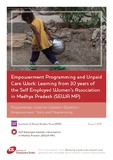| dc.contributor.author | Zaidi, Mubashira | |
| dc.contributor.author | Chigateri, Shraddha | |
| dc.contributor.author | Chopra, Deepta | |
| dc.coverage.spatial | India | en |
| dc.date.accessioned | 2017-08-29T16:04:51Z | |
| dc.date.available | 2017-08-29T16:04:51Z | |
| dc.date.issued | 2017-08 | |
| dc.identifier.citation | Zaidi, M., Chigateri, S. with Chopra, D. (Ed.) (2017) Empowerment programming and unpaid care work: learning from 30 years of the Self Employed Women’s Association in Madhya Pradesh (SEWA MP), Programmatic Notes. Brighton. IDS. | en |
| dc.identifier.uri | https://opendocs.ids.ac.uk/opendocs/handle/20.500.12413/13160 | |
| dc.description.abstract | The Self Employed Women’s Association (SEWA) aims to provide an enabling environment for women’s inclusion into economic growth processes through mobilising workers to claim their rights and entitlements from the state and employers; promoting livelihood generation; and promoting financial self-reliance. The organisation recognised a close relationship between unpaid care work and paid work soon after it formed, and has a vision of setting processes in place to make the state accountable for supporting women’s unpaid care work. This Programmatic Note examines the work of SEWA in Madhya Pradesh (SEWA MP), India, in order to understand how women’s economic empowerment (WEE) policy and programming can generate a ‘double boon’ – paid work that empowers women and provides more support for their unpaid care work responsibilities. The research found that many women had benefited from joining SEWA, due to increased access to information and services, training, better working conditions, access to the SEWA cooperative for savings and loans facilities, and a sense of empowerment emanating from the recognition of the value of the work that they do. It is recommended that order to engender a ‘double boon’, SEWA could take actions that included: a) expanding the range of training courses; b) including men in its discourses and outreach; c) creating childcare arrangements; and d) explicitly engage with the issue of unpaid care work. | en |
| dc.description.sponsorship | Department for International Development (DFID) | en |
| dc.description.sponsorship | William and Flora Hewlett Foundation | en |
| dc.description.sponsorship | International Development Research Centre (IDRC) | en |
| dc.language.iso | en | en |
| dc.publisher | Institute of Development Studies / The Institute of Social Studies Trust (ISST) | en |
| dc.rights.uri | http://creativecommons.org/licenses/by-sa/3.0/ | en |
| dc.subject | Gender | en |
| dc.subject | Livelihoods | en |
| dc.subject | Work and Labour | en |
| dc.title | Empowerment Programming and Unpaid Care Work: Learning from 30 years of the Self Employed Women’s Association in Madhya Pradesh (SEWA MP) | en |
| dc.type | Other | en |
| dc.rights.holder | Institute of Development Studies / The Institute of Social Studies Trust (ISST) | en |
| rioxxterms.funder | Default funder | en |
| rioxxterms.identifier.project | balancing | en |
| rioxxterms.version | NA | en |
| rioxxterms.funder.project | c561005b-4dfd-4783-8230-386bf6281d0a | en |


